2015 Annual Report
Translated by Amber Streker
For the Atlantic Academy 2015 marked a year of change. In addition to personnel changes, the three pillars on which our work is based, conference, education, and counseling, took on more forms, and with it, new project forms were integrated into our program.
The issues with which we occupied ourselves covered wider and deeper topics. While the NSA scandal took a back seat, especially because of the debate in Germany about the practices of their own intelligence, the negotiations on the transatlantic FTA TTIP remained topical. Likewise, the crisis in Ukraine continued to engage us this year. In the course of the movement of refugees as a result of the civil war both in Syria, Iraq, and Afghanistan, we dedicated ourselves intensely to the matters that came about, including refugee policy, war and peace in and around Europe, and the future responsibility of Germany on in world politics.
Added to this was the central role of the Atlantic Academy in the Transatlantic Conference 2015. The representatives of Rhineland-Palatinate and South Carolina met in Mainz, Kaiserslautern and Koblenz and discussed the various aspects of education policy on both sides of the Atlantic. The conclusion, which was also a highlight of the conference, was the visit and the speech of the Ambassador of the United States of America, John B. Emerson, in the Mainz State Chancellery.
Not only the foreign trade, foreign, and security policy identified the concluding year. Issues such as civil rights in the U.S., the validity of minorities, protest movements such as Black Lives Matter, and the strengthening of sustainable development and environmental protection were also part of the program of the Atlantic Academy.
Be it through possibilities of encounter between Germans and Americans, the extensive range of political education, or consulting work, it was repeatedly clear, through all aspects of our projects, that the importance of the Atlantic Academy for the transatlantic relationship cannot be overestimated.
The creation of new positive memories and connections is even more important in times in which a positive German-American history faces one or other scandal or different points of view, but also as the emerging anti-American sentiment in Germany threatens to fade. Her
„In its diversity and engagement, the Atlantische Akademie has become a symbol of all that the thriving transatlantic community aspires to be in the complex, multipolar world of the 21st century.”
More Diversity - Exciting Projects
The variety of projects has led us to speak of the future not only by events, but rather more so by projects. In addition to our school workshops and exhibitions, internal events and special projects were part of our program.
As of 16 December 2015, the Atlantic Academy has carried out 62 projects this year, including six Atlantic Forums, six workshops, three conferences, two exhibitions, and the special project, Donation Drive "KMC for Refugees.” These events reached 2,972 participants.
The PfalzAkademie Lambrecht was used four times for our events. In addition to a seminar on the current challenges of international security policy, and a seminar on the role of presidential rhetoric, we were welcomed in August for our customary Summer School. In November of this year, the traditional meeting of political scientists of the Deutschen Gesellschaft für Amerikastudien (DGfA) took place in Lambrecht, and dealt with the topic "American Exceptionalism Revisited".
Our Cooperation Partners
In order to maintain the high quality of our projects and make them accessible to a broad public, close cooperation with reliable partners is necessary.
With more than 44 partners this year, we designed, organized, and carried out projects. Among the main partners are once again the U.S. Consulate General, the Political Science department at the Technical University (TU) Kaiserslautern, the German-American International Women’s Club (GAIWC), the Weiterbildungszentrum Ingelheim, and the Europe Direct Information Center Kaiserslautern.
With the addition of the Wirtschaftsförderung Kaiserslautern, the Lesben- und Schwulenverband, lauterjungs und -mädels Kaiserslautern e.V., the KMC Eagles, the Ruff Ryders, and many others, we have gained a total of 13 new partners since 2014.
In order to offer such a high number of projects at a high level, the acquisition of external funding is essential. We were able to build the State Offices for Political Education in Hesse and Rhineland-Palatinate with aid from the Federal Agency for Civic Education, which also supported our Summer School and the political seminar of German and American students. We also received funding from the Lottostiftung Rheinland-Pfalz and the Europe Direct Information Center Kaiserslautern. We were especially pleased to receive a donation of more than 1,500.00 euros, to support the re-creation of our website, from the GAIWC.
Issues and Impressions
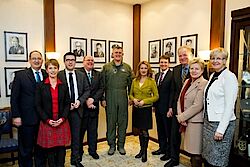
To show you a sample of the many facets of our program, here are a few topics and impressions.
2015 started with a very interesting meeting of the Executive Board and the Director of the Atlantic Academy with General Frank Gorenc, commander of U.S. Air Forces in Europe (USAFE), the U.S. Air Forces Africa (AFAFRICA) and the Allied Air Command (AIR COM Ramstein) and Director of the Joint Air Power Competence Centre (JAPCC) at the Ramstein Air Base. In this meeting the Atlantic Academy presented their work and lay the foundations for the development of our first pillar (strengthening the encounter between Germans and Americans).
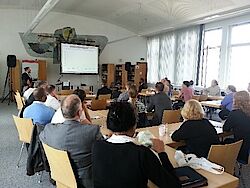
In this area, the new lecture series "Brown Bag Luncheon on Entrepreneurship" will take place. We launched this series together with the Wirtschaftsförderung Kaiserslautern, the American German Business Club Kaiserslautern and the U.S. Consulate General. This should also give Germans and Americans who want to start their own business a better understanding of the business promotion structure in Kaiserslautern area.
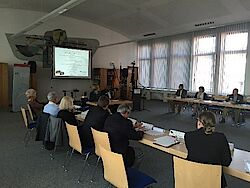
While our education pillar is already well developed, it was and still is our aim to further develop the field of consulting. To this end, the Atlantic Academy had an excellent opportunity in the wake of the Transatlantic Conference 2015. The state government of Rhineland-Palatinate, welcomed a delegation from the partner state South Carolina and discussed the issue of education. The academy was already involved in the preparation of the conference as an advisory institution in terms of content, and allowed the two delegations to exchange views on "Early childhood education and strategies for school readiness" and "Municipal and City Partnership" on their premises. The conference resulted in the signing of a Memorandum of Understanding to strengthen academic exchanges between the two partners, a project in which the Atlantic Academy will be involved with in the future. The Academy will also take part in the Transatlantic Conference 2017 at the South Carolina Consulting Institution and will serve as a member of the preparatory committee.
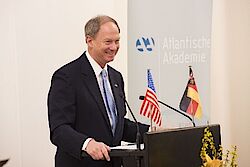
The completion of the Transatlantic Conference 2015 was certainly a highlight of our program year. John B. Emerson, the American ambassador to Germany, visited the state chancellery in Mainz and gave a speech on transatlantic relations.
Another new feature this year is the establishment of the Forum Network America, where we, the Rhineland-Palatinate Universitätsinstitute, and its professorships are trying to forge a network, and in the future to develop joint programs which focus on the United States. In the first meeting we worked with the Institute for Obama Transnational American Studies at the Johannes Gutenberg Universität Mainz, on the theme "Black Poetics & Black History".
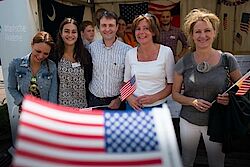
After the Atlantic Academy waived participation in the Rheinland-Palatine day in 2014 for reasons of cost, we were there once again in 2015 in Ramstein-Miesenbach. Our traditional contest, which was generously supported by the Chamber of Commerce of South Carolina, enjoyed great popularity. In addition, chairwoman Heike Raab, and even Minister-President of the State of Rheinland-Palatine Malu Dreyer paid us a visit.
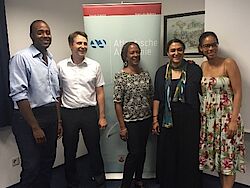
A particularly remarkable lecture event took place in cooperation with the U.S. Embassy, the Weiterbildungszentrum Ingelheim, and the Landeszentrale für politische Bildung in Rheinland-Pfalz. Lecia Brooks from the Southern Poverty Law Center (SPLC) in Montgomery, Alabama, gave an impressive lecture on the role of police violence and individual perpetrators in the lives of African-American population of the United States. With the recent massacre in Charleston, South Carolina, the event took place in the midst of a relevant and heated debate. At the suggestion of our chairwoman Heike Raab, Lecia Brooks visited the prison Diez with the director of the Academy as well as the new Public Affairs Officer of the U.S. Consulate General and AA board member, Lawrence Randolph. The visit imprinted an image of the German penal system on our American guest, and contributed to the lobbying of the SPLC in terms of prison reform as discussed in the U.S.
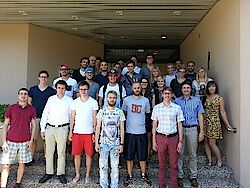
Our annual Summer School took place this year with the theme "Signed, Sealed, Delivered?" and devoted itself to looking at the domestic and foreign policy record of Barack Obama's presidency. The topic attracted so many interested participants that the Summer School was fully booked.
Also fully booked this year was our Atlantic Summer, traditionally organized with the Deutschen Atlantischen Gesellschaft and the Sektion Bad Neuenahr-Ahrweiler der Gesellschaft für Sicherheitspolitik. On the occasion of the 40th anniversary of the CSCE / OSCE this year, the question of the peace in Europe was at the center. The presentations by researchers and practitioners investigated the previous balance and the future of this conflict control institution.
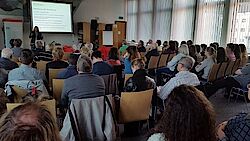
The continuing movement of refugees was also an important issue in the Atlantic Academy program. In addition to a large special project that will be addressed later, the migration policy of the European Union and the United States stood at the center of two events, which were carried out in cooperation with the Europa Direkt Informationszentren in Kaiserslautern and Koblenz. In addition, the migration researcher Sascha Krannich of Universität Münster gave a lecture in Koblenz, as did the state’s Commissioner for Migration and Integration Miguel Vicente. At both events were a total of 137 participants.
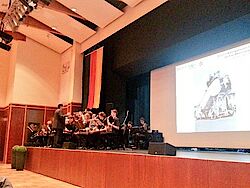
Another highlight were the celebrations for German-American Day on 6 October 2015 “Haus des Bürgers” in Ramstein-Miesenbach with the DAIFC and DocuCenter Ramstein. More than 130 guests of the performances could listen to Rittersberg Big Band and attend the ceremony for the conductor of the band, and teacher at Rittersberg Gymnasium, Markus Lücke, held by the DAIFC for his services towards German-American cooperation.
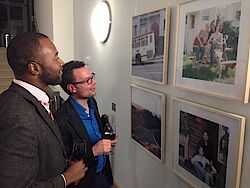
On the occasion of the General Assembly on 8 December 2015, the Atlantic Academy opened an exhibition of photographs by Daniel Schumann that depict the lives of lesbians, gays, bisexuals and transsexuals in San Francisco and the surrounding area. At this event we welcomed nearly 50 interested parties. Hardly any other social and socio-political issue in the US has underwent such a rapid and progressive development in recent years like the debate over same-sex marriage. The photo exhibition is on view in Rathaus Nord until 29 January 2016.
In 2015, like every year, we also organized the Atlantic Forum in cooperation with Professor Jürgen Wilzewski of the political science department at the TU Kaiserslautern. We greeted 314 guests to this event.
We have also continued to keep an eye on the still hotly debated planned Transatlantic Trade and Investment Partnership (TTIP). In our three lectures we achieved 176 prospective customers. At our event in Landau on 27 May 2015 alone, came 96 citizens.
Special Project „Donation Drive. KMC For Refugees“
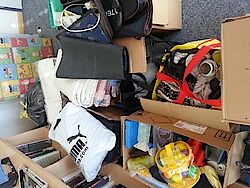
Besides our lectures in Kaiserslautern and Koblenz, the Atlantic Academy has been engaged intensively in tackling the challenge of recent refugee movements. Many Americans have come to us in recent months and asked for ways to actively help. The office took this opportunity to create a "Donation Drive" to encourage the American citizens to donate. The response was overwhelming and within a few weeks the lecture hall of the Academy was overflowing with donations. Together with members of the US Hockey Association KMC Eagles, and the US motorcycle club Ruff Ryders, donations were sorted and then brought to the appropriate places (e.g. Sozialkaufhaus der Caritas, Fairness-Kaufhaus der LEBENSWERK-Genossenschaft).
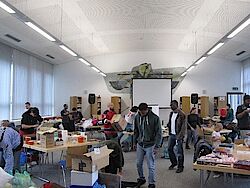
A result of this commitment is the future close cooperation with the Office of Asylum of the city of Kaiserslautern. The Atlantic Academy will serve as an institutional mediator for interested Americans, and will administer these matters in an advisory capacity.
Publication Series "Atlantic Texts"

Promoting America-related science is a central concern of the Atlantic Academy, which puts us in the center of the American scientific network in Germany.
This includes our publication series "Atlantische Texte." This year, a cost-neutral volume for the Atlantic Academy was released. This deals with the outcome of the meeting of DGfA for progressivism in the US.
New Ways. Social Networks and the Work of the Atlantic Academy
This year the Atlantic Academy started accounts on Twitter (@AtlantAkademie) and Facebook (@AtlantischeAkademie), in order to take advantage of these two key social networks. The channels can be used for different matters. While Twitter is used as a medium for demanding content, live reports, and networking, Facebook is seen as a platform for general information, theme series and outreach. We succeeded, to quadruple the number of those who follow our Twitter and double our followers on Facebook.
Among the people who follow our channels, spread our news, and comment, includes the parties to the Rhineland-Palatinate state parliament, the US Consulate General in Frankfurt, the US Embassy, the US Mission to the EU, the EU Trade Commissioner Cecilia Malmström, the German embassy in the United States and the German Ambassador Peter Wittig, the Special Adviser to the US President Valerie Jarrett, the US Secretary of Housing and Urban Development Julian Castro and the coordinator of the US president for the Middle East and North Africa Rob Malley. There are also various news portals on state, federal and EU level.
Press Work. Outside view of the Atlantic Academy
This year, the Atlantic Academy looks back on many mentions in the press. Appearing in such publications as the magazine of Verbands Deutsch-Amerikanischer Clubs (VDAC), Gazette, and Kaiserslautern American, the newspaper for members of the Kaiserslautern military community. Inside these publications the Academy and their work were presented. The involvement in the fundraiser for Refugees gained particular attention.
New Challenges and Opportunities for the Atlantic Academy
The Atlantic Academy looks back on an exciting and varied 2015 and at the same time prepares for new challenges in the coming year. Our program in 2016 will hold 40 planned projects. In addition to the continuation of our proven and recognized events such as the policy seminar with the VDAC, the Summer School, German-American Day, and the symposium of DGfA. The further expansion of new formats such as the "Brown Bag Luncheon" and the Forum Network America will also take center stage. Furthermore, a variety of transatlantic occasions wait for due diligence to be paid in the form of one project or another. The Atlantic Academy also commits to celebrate its 20th anniversary in 2016 with a lecture in Mainz.
In the United States the year 2016 will be primarily marked by the November presidential and congressional elections. In addition to events the online publication series "The Atlantic Academy's Road to the US Elections," a monthly publication in which renowned US experts consider individual policies in the light of the previous and upcoming elections, and formulate their expectations of a future administration and Congress.
In addition, the implementation of the project "Welcome to Rheinland-Pfalz" for the Ministry of the Interior, for Sports and Infrastructure, better linked the Rhineland-Palatinate communities and their American residents with each other, and thus an interface between the subject-points, local politics and US stationing policy, is to be created. The necessary human and material resources will be fully supported by additional project funding from the Ministry. This builds the Atlantic Academy position as an advisory institution for the state, the local communities, and further out.
As explained above, the object of the Atlantic Academy is more important than ever in a changing transatlantic relationship. These are the new challenges we will face and look forward to in the program year 2016.



